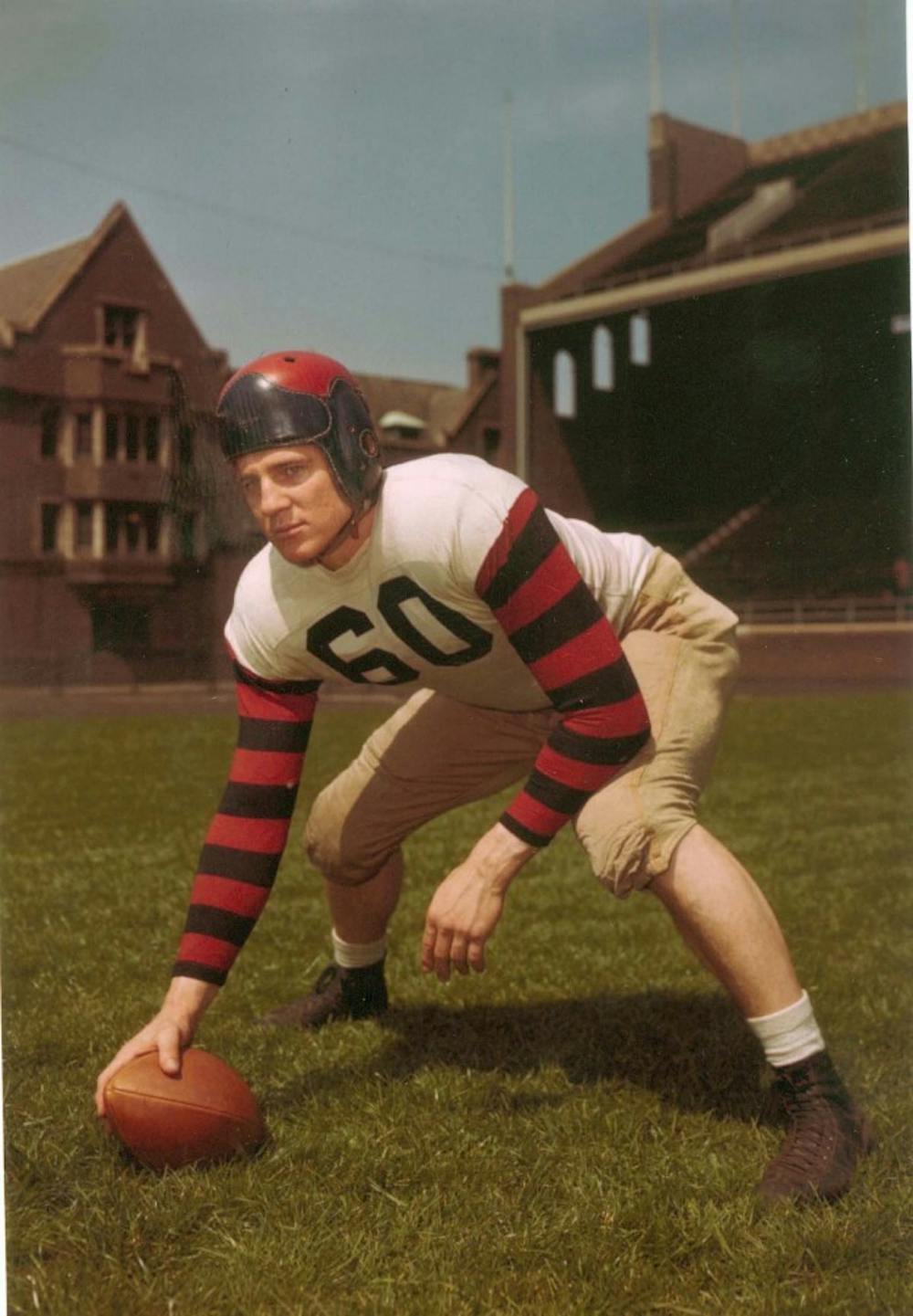
Chuck Bednarik was one of the greatest, if not the greatest, players in Penn football history, a two-time All-American from 1945-48 after serving in World War II. He went on to have a Hall of Fame career with the Philadelphia Eagles in the NFL>
Credit: Courtesy of Penn AthleticsPenn football legend and former Philadelphia Eagle Chuck Bednarik died on Saturday. He was 89.
A three-time All-American for the Quakers in the 1940s, Bednarik is one of the most recognizable figures in the history of Penn Athletics. The Bethlehem, Pa., native played center, linebacker and punter for the Red and Blue between 1945 and 1949, becoming one of the most famous college football players of the 20th century during his time at Penn.
“It is heartbreaking to hear of the loss of Chuck,” coach Ray Priore said in a statement. “He was not only one of Penn’s all-time best, but one of the greatest college football players to ever play the game. More importantly, he was held in the same regard off the field and will be missed by so many.
“I know the entire Penn community and football world is deeply saddened by this loss, and all our thoughts are with his family at this time.” moved last sentence up (doesn’t need its own paragraph)
Although Bednarik played for the Red and Blue for four seasons, he was already 20 years old by the time he arrived at Penn. An eventual member of Penn Athletics’ inaugural Hall of Fame class in 1996, Bednarik served in World War II, flying over 30 combat missions as a gunner with the Eighth Air Force.
For his services as a First Lieutenant in the war effort, Bednarik was awarded the Air Medal, four Oak Leaf Clusters and four Battle Stars.
At Penn, Bednarik established himself as a force in all facets of the game. In addition to his three-time All-American status, Bednarik won the Maxwell Award, one of the honors given annually to the college football player who is viewed as the best player in the nation.
Bednarik was the second of three players in Penn football history to win the Maxwell —added uberdash; deleted “after” Bob Odell won the award in 1943 and Reds Bagnell captured the honor two years after Bednarik in 1950. The linebacker also finished third in voting for the Heisman Trophy in 1948.
After his Penn career came to an end, Bednarik was drafted first overall in the 1949 NFL Draft by the Eagles. The former Red and Blue stalwart played professionally for 14 seasons, missing only three games in his entire career.
“I have had the opportunity to spend time with Chuck Bednarik, who is truly one of the most unique players that this game has ever seen,” Eagles coach Chip Kelley said in a statement released by the team. “The foundation of this organization and this league is built on the backs of past greats, with Chuck at the forefront.”
Bednarik was a part of Philadelphia’s NFL Championship teams in 1949 and 1960, continuing his stretch of play on both sides of the ball.
In the offseason, Bednarik worked with a local concrete company, earning him the nickname “Concrete Charlie.”
After retiring in 1962, Bednarik was inducted into the Pro Football Hall of Fame in 1967, his first year eligible for enshrinement. The linebacker’s credentials for induction were boosted by eight Pro Bowl selections and 10 All-Pro selections in his 14-year career.
Two years after entering the Hall of Fame for his time with the Eagles, Bednarik was inducted into the College Football Hall of Fame. The Eagles retired his number 60 and inducted Bednarik into the team’s Hall of Fame in 1987.
In 1995, the Maxwell Football Club — the same association in charge of the Maxwell Award —changed dashes to uberdashes established the Chuck Bednarik Award to honor the nation’s best defensive player at the end of each season.
And although his time on the field may have passed, Bednarik’s legacy within Penn Athletics and Philadelphia sports will live on.
The Daily Pennsylvanian is an independent, student-run newspaper. Please consider making a donation to support the coverage that shapes the University. Your generosity ensures a future of strong journalism at Penn.
DonatePlease note All comments are eligible for publication in The Daily Pennsylvanian.







